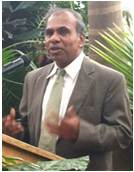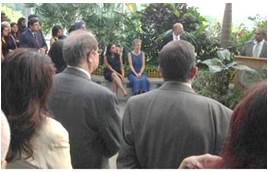By Kollengode S Venkataraman
Striving to keep the technological edge it has cultivated over the decades, significantly strengthening endowments for its long-term stability and growth, and aesthetically embedding motifs of performing and visual arts throughout the campus are on the “To-Do†list of Dr. Subra Suresh, the new President of Carnegie Mellon University (CMU). The last one is not trivial. CMU’s College of Fine Arts, though among the best in the nation, is often overshadowed by its techie image among the general public.
Dr. Suresh shared these points in his freewheeling remarks in the reception given to him at the Phipps Conservatory on Tuesday August 27 by Sunil & Nita Wadhwani on behalf of Pittsburgh’s Indian-Americans. Mr.Wadhwani is on the governing board of CMU. The 200-plus invitees represented Indian-Americans of diverse background.
After his 3-year tenure as the head of the prestigious National Science Foundation, whose mandate is to identify and fund the advanced research needs in all branches of science, Dr. Suresh is now at the helm of Carnegie Mellon. As Sunil Wadhwani said in his opening remarks, CMU gives its presidents long tenures—in CMU’s over 100-year history, Dr. Suresh is only its ninth president.
Dr. Suresh, the first India-born scientist to head a major cutting-edge US university, has ambitious goals even as he recognizes the competition from other big players. After all, he was at MIT and Brown University teaching and in research and administration as well.
In his unscripted easygoing remarks, Dr. Suresh also touched on the reasons for the high cost (~$45,000/year) of undergraduate education in private universities—not eligible for any state grants, and daring to pursue cutting edge research that state legislatures will not be interested in funding. Ironically, he said, these cutting edge researches spawn multi-billion dollar industries employing thousands while keeping the US as the technology leader. But this is little comfort for a family of four with an annual taxable household income of $50,000.
One question to him from the audience was whether CMU will open a campus in India as it and other
universities have done in other nations. The gist of Dr. Suresh’s answer was: Opening an off-shore campus is one of the ways, certainly not the only way, in which CMU can strengthen education in India. Outside the US, he said, India has the largest number of CMU alumni in universities, industries, and in R&D. CMU can innovatively capitalize on this soft resource without opening an Indian campus, to have an impact on technical education in India while also benefitting CMU.
He did recognize that a $45,000/year CMU campus in India would be over Rs.2.5 million (Rs. 25 lakhs) per year in school fees, a huge sum.
We can see his point. This will not sit well. In India even for working people with college degrees, the family income would be only round Rs. 600,000 (Rs.6 lakhs) per year, not to speak of India’s working poor.
Suresh, accompanied by his wife Mary, a public health professional with her own credentials, spent the reminder of the evening getting to know the Indian-American community in town. The canopy of the Phipps’s live exhibit of the Tropical Forest India, provided a perfect ambience in every measure—brightly sunny and humid with temperatures in the 80s.
The Taj Mahal Restaurant provided the catering for the reception.


